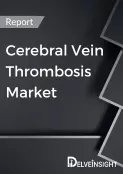Cerebral Vein Thrombosis (CVT), or cerebral venous sinus thrombosis (CVST), is an uncommon form of stroke caused by a blood clot in the dural venous sinuses—vessels that carry blood from the brain. When obstructed, these vessels can lead to raised intracranial pressure, brain hemorrhage, and significant neurological injury. Although rare, CVT’s unique causes and growing recognition have made it an area of increasing interest for healthcare providers, diagnostic specialists, and drug developers.
The Cerebral Vein Thrombosis Treatment Market has advanced considerably in recent years. Greater knowledge of the condition’s risk factors, new imaging technologies, and the move toward individualized care have transformed patient management. Early detection and preventive strategies are also playing a larger role in improving prognosis.
For years, CVT was frequently overlooked in diagnosis because its symptoms can be misleading. Common signs like headaches, visual changes, seizures, and cognitive issues often resemble other disorders. Now, with advanced imaging methods such as MRI and MRV, clinicians can detect CVT earlier and more reliably. This shift toward prompt diagnosis has increased the need for effective therapeutic options.
Anticoagulation therapy continues to be the primary approach. Acute treatment usually involves heparin or low molecular weight heparin, followed by long-term oral anticoagulants to resolve clots and prevent recurrence. Despite their effectiveness, traditional therapies have limitations, which is why the Cerebral Vein Thrombosis Therapeutics Market is now focusing on newer anticoagulants that improve safety, convenience, and compliance.
Direct oral anticoagulants (DOACs) represent one of the most promising advancements. With predictable effects, simplified dosing, and less frequent monitoring, they are being evaluated for use in CVT treatment. Their adoption into clinical practice could generate significant growth opportunities for Cerebral Vein Thrombosis Companies and alter the treatment landscape.
Managing CVT also involves supportive care to address complications like seizures, intracranial hypertension, and neurological deficits. The development of advanced neuromonitoring systems and targeted interventions in neurocritical care units has greatly improved patient stabilization.
Prevention is increasingly emphasized, as CVT often develops in the presence of identifiable risk factors, including pregnancy, hormonal therapy, malignancy, genetic clotting disorders, and certain infections. Risk assessment tools, genetic screening, and tailored lifestyle adjustments are becoming essential elements of patient care.
The Cerebral Vein Thrombosis Drugs Market is benefiting from strong research collaboration between academic institutions, biotech innovators, and large pharmaceutical firms. These partnerships are driving advancements in drug development, diagnostic biomarkers, and digital health applications. Regulatory frameworks for rare diseases, including orphan drug programs, are further stimulating investment.
Technological innovation is also shaping the Cerebral Vein Thrombosis Market Size. AI-powered analytics, predictive modeling, and telemedicine are improving the ability to identify high-risk patients, create tailored treatment plans, and extend specialist care to underserved areas.
Still, there are barriers to overcome. Limited trial data for certain patient populations, diagnostic delays in low-resource environments, and the low prevalence of the condition hinder the establishment of universal care protocols. Continued research, medical training, and infrastructure improvements will be necessary to address these challenges.
Looking forward, steady growth in the CVT market is anticipated. The combination of innovative drug development, precision medicine, and digital health solutions will likely define future care models, enabling better outcomes and broader access for patients worldwide.
Latest Reports Offered by Delveinsight:
Novel Drug Delivery Devices Market | Osteoarthritis Market | Physiotherapy Equipment Market | Retinopathy Of Prematurity Market | Urolithiasis Market | Vaginal Rejuvenation Systems Market | Valley Fever Market | Acute On Liver Failure Market | Adrenal Cortex Neoplasms Market | Advanced Cancer Pain Management Market | Aids Related Kaposi’s Sarcoma Market | Angioedema Market | Autosomal Recessive Congenital Ichthyosis Market Size | B-cell Non-hodgkin Lymphoma Market | Balloon Valvuloplasty Device Market | Blood Glucose Monitoring Systems Market | Bone And Joint Infection Market | Cannabis Use Disorder Market | Capnography Devices Market | Carcinoid Syndrome Market
Latest Reports:
https://www.delveinsight.com/sample-request/thymidine-kinase-2-deficiency-tk2d-market
https://www.delveinsight.com/sample-request/intraocular-lens-market
https://www.delveinsight.com/sample-request/vyndaqel-drug-insight-and-market-forecast
https://www.delveinsight.com/sample-request/tiglutik-emerging-drug-insight-and-market-forecast
https://www.delveinsight.com/sample-request/phosphor-screen-scanners-market
https://www.delveinsight.com/sample-request/jta-004-emerging-drug-insight-and-market-forecast
https://www.delveinsight.com/sample-request/olpasiran-market-size-forecast-and-emerging-insight
https://www.delveinsight.com/sample-request/k-232-drug-insight-and-market-forecast
https://www.delveinsight.com/sample-request/atopic-dermatitis-ad-epidemiology-forecast-insight
About DelveInsight
DelveInsight is a trusted provider of life sciences and pharmaceutical market research and consulting, offering actionable insights that empower organizations to make informed decisions. With a commitment to delivering strategic intelligence, DelveInsight serves as a key partner to global pharmaceutical, biotechnology, and healthcare companies looking to excel in an evolving market landscape.
Contact Us
Kanishk
Email: kkumar@delveinsight.com

